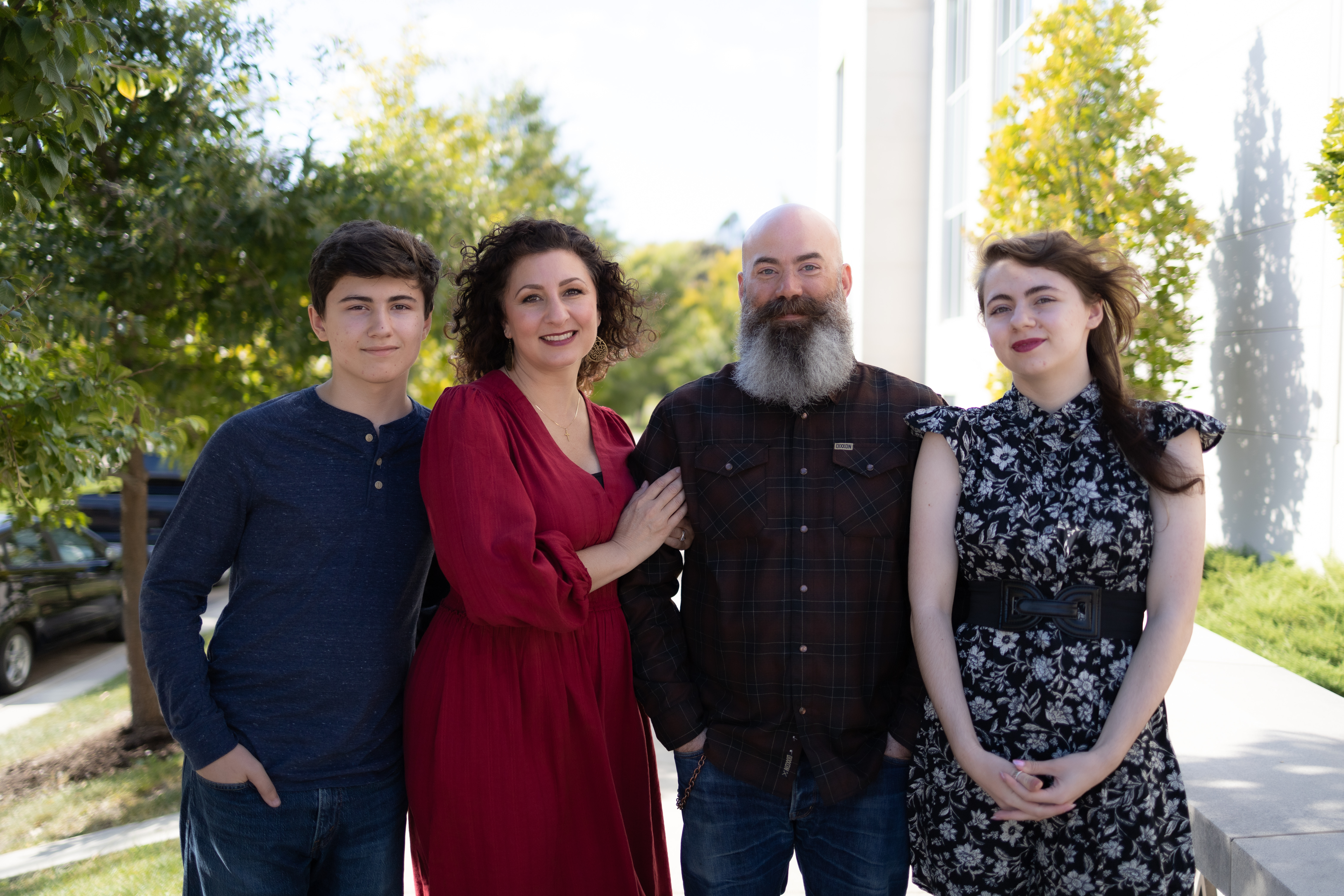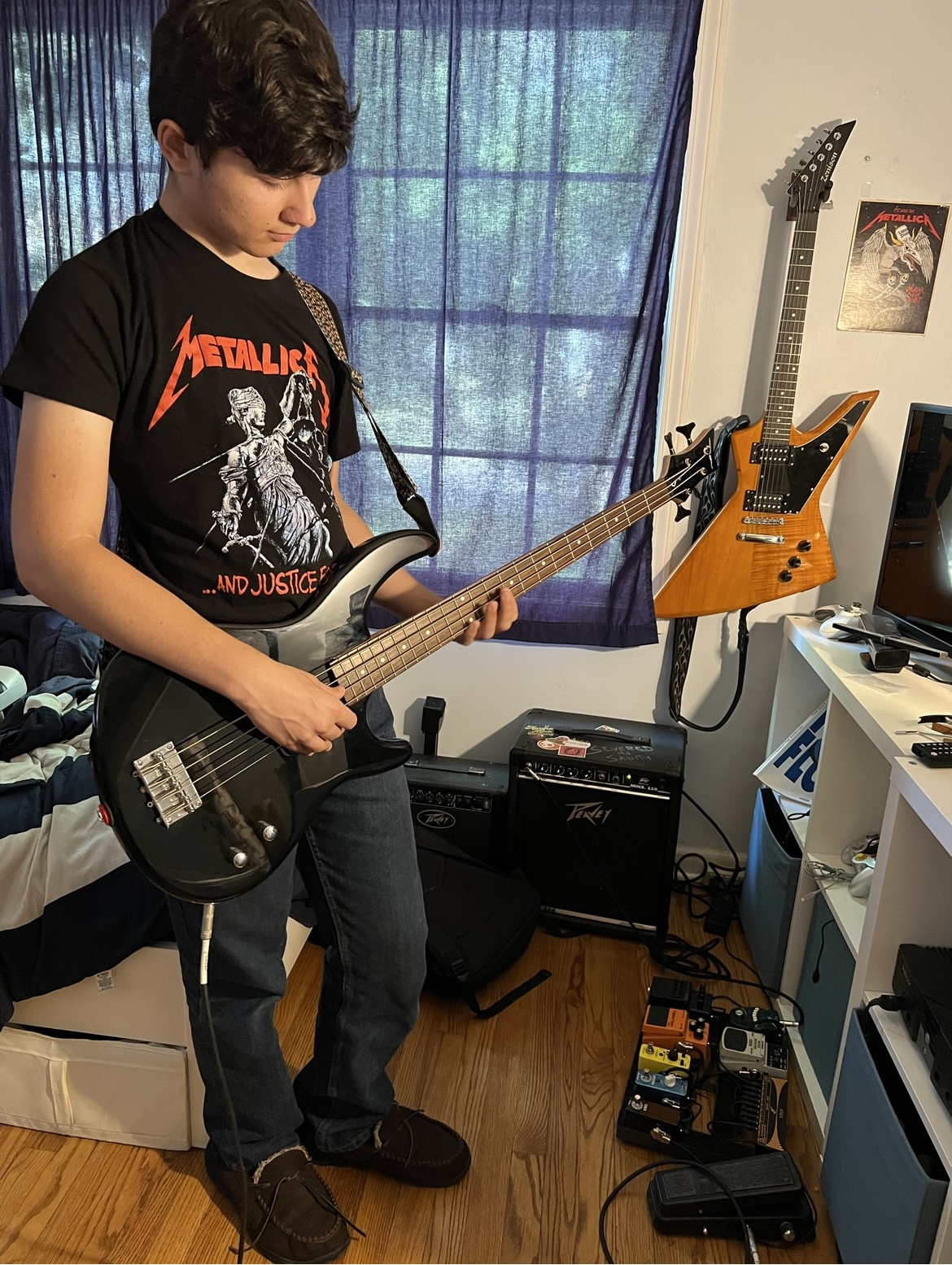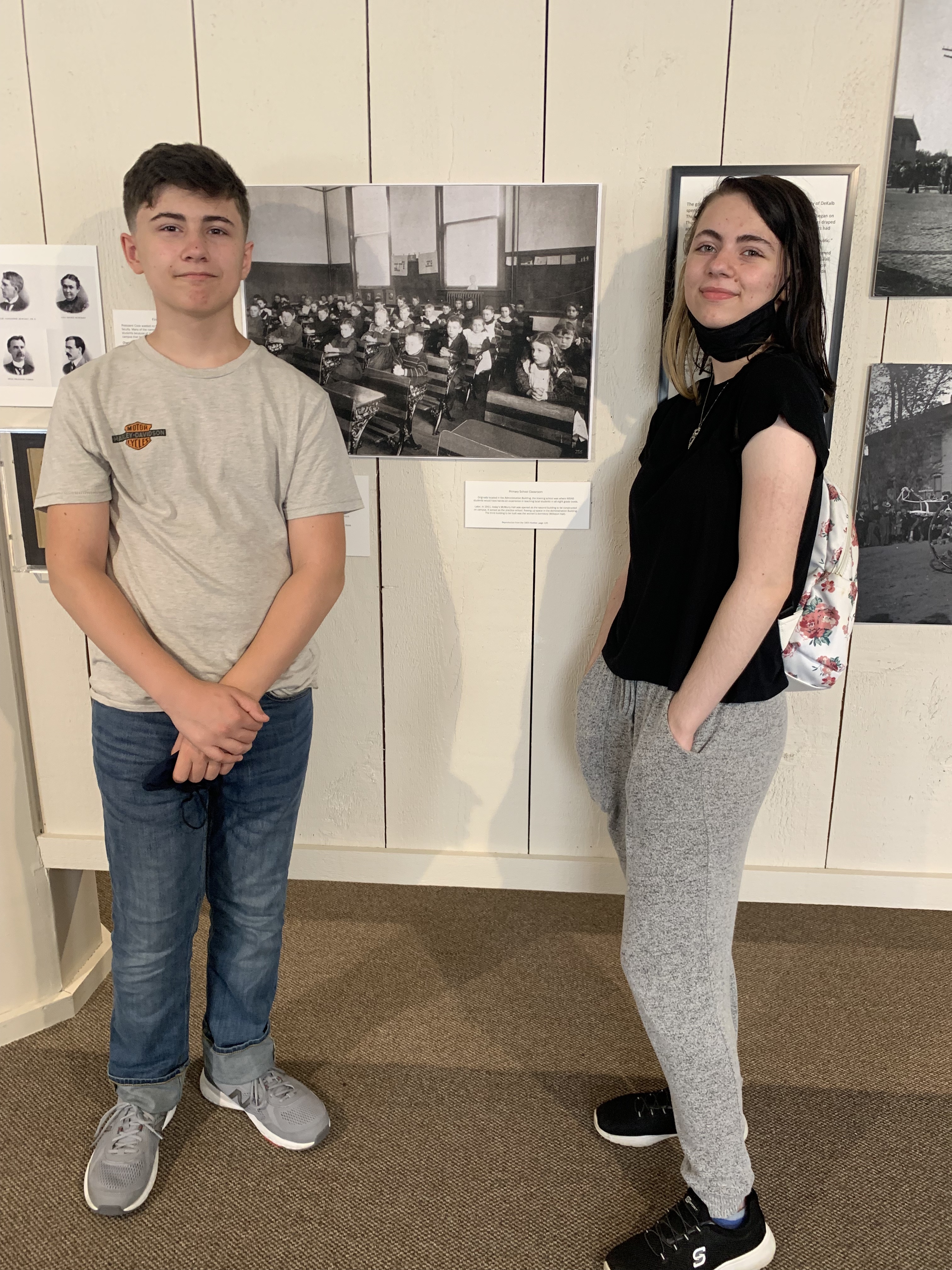Introduce yourself.
My name is Cherron Page and I grew up in a western suburb of Chicago. I attended public school and went to college to study elementary ed, although I withdrew shortly before my student teaching. I currently live in DeKalb, Illinois with my husband, Jamie, of almost 25 years and our two children, Noel who is 16 and Calvin who is 15.

We are about to begin our 8th year homeschooling. We started out with a school-at-home approach and relaxed into unschooling within a few years.
Why did you decide to homeschool?
The first reason we chose to pull our children out of the school system to homeschool was due to academic reasons. When Calvin was in 2nd grade, it became apparent through testing and boredom with material that he was significantly advanced in both math and language arts. The small elementary school that he attended did not offer any enrichment and refused to promote him to the next grade level. We knew that homeschooling would allow him to learn and progress at his own pace.
Another reason was that Calvin had experienced bullying to varying degrees and we knew that the violence would only increase with each grade level. By 2nd grade, his lunch was being stolen every day with no sympathy or action from the teacher or staff. By bringing Calvin home, he would be able to have a peaceful environment, carefully select his own friends, and enjoy meals.
Since we began homeschooling, I have seen many other benefits. But, these were the initial reasons that made us take the leap.
What are the biggest challenges you've faced as a homeschooling mom, and how have you overcome them?
When we first began homeschooling, I replicated the school environment at home. I played the role of authoritarian parent. And, I imposed rigid curriculum on my children. Of course, power struggles arose and led to tears - theirs and mine.
Eventually, I learned about unschooling and began to implement the practices. I centered my children as learners and and honored their innate curiosity vs. seeing them as a blank slate to write on or an empty cup to fill. I dismantled the hierarchy in our family and became my children's supporter, co-learner, and cheerleader. I ditched unnecessary textbooks, workbooks, tests, grades, and assignments. Instead, I freed my children to simply learn for the sake of learning without uninvited assessment or judgement from me.
But, most important of all, I spent dedicated time connecting with my children. Building a strong relationship has been the biggest benefit to our homeschool. My kids know that they can ask me questions and trust me with answers. It has been a challenge to make such a huge change in philosophy and practice, but the fruit produced has been worth it.
From your perspective, what are some of the key differences between homeschooling and traditional schooling?
Traditional school is a system that seeks to educated masses of young people. This is done in a restrictive, highly controlled environment and requires obedience and compliance of each student. The narrow set of information and skills taught are required whether children are interested or not. Behaviorism strategies are used to keep order.
In contrast, homeschooling is a completely individualized education based on the needs and interest of each child. Classroom management strategies of punishments, rewards, shame, competition are no longer necessary. The home and community are places of peace and collaboration.
Homeschooling offers freedom to children to explore their world, in their own way, in their own timing. The education acquired by homeschooling is holistic and broad in that it encompasses not just academics, but the mind, body, soul, and spirit of a person. And all by those who know them and love them most, their parents or guardians.
How do you handle subjects or topics that may be challenging to teach, especially in high school, such as advanced mathematics or specialized sciences?
When it comes to my teen's interests and goals, they are in the driver's seat. And, I take more of a mentor and guide. We are unschoolers and so we view subjects from a different angle. We take what we are learning about and notice the often multiple subjects that are touched up in what we do.

For example, my daughter is curious about outer space. Aside from the obvious subject of astronomy, she has also begun to learn the history of space exploration, math concepts for distant planets, fine arts as she expresses her enjoyment in what she is learning, and so on. If she decides to pursue astronomy to a higher level, I will help her seek out resources in a lesson style that she does best in, from teachers or experts in their field for her to reach her goals.
Most of the time, however, I consider myself a co-learner vs. teacher or just mentor/mom. The most beautiful thing about homeschooling is having a do-over of your education, learning alongside your children and experiencing the joy of discovery together.
Does homeschooling get difficult when kids get in higher grades?
One of the benefits of homeschooling is not having to wake up early. Teenagers' circadian rhythm changes and they become almost nocturnal. This has changed what our daily schedule looks like.
My daughter just started her first job and this counts as a huge learning experience in and of itself. The high school years in our home have shifted to include life skills training and focus on figuring out who they are as people. The most "difficult" aspect of the higher grades is inside our heads and hearts. The time is running out and the stakes seem higher with the seeming pressure to keep up with those around us. Fear and doubt often arise and it's a challenge to remain calm and speak truth to each concern.
Stepping off the traditional path is scary at times, but the happiness and well-being of my teens is evidence enough for my husband and I that homeschooling is the right choice for our family.
How do you approach the selection of curriculum and learning materials for your homeschooling?
Cost is definitely an issue in our home as we make financial sacrifices for me to be able to stay home full time. So, anything that my children want to investigate usually starts with the questions: Can we find the information free on the internet? Do we know someone who will help/teach us? Does the library have any resources that we can borrow? Is there a fellow homeschooler that would hand us down any used curriculum or books? Backing up a bit, not every interest or curiosity of my children needs formal lessons.
Occasionally, children just want to dabble in an interest or teach themselves. For example, my son is teaching himself to play guitar. He has researched music theory and other necessary information online. But, the rest is all him. He has no interest, at this time, in lessons. And he is able to participate in the band at church. But, should he want to level up in his progress, we will seek out lessons from a friend who is an expert in guitar.

As unschoolers, our relationship to curriculum is as just one tool in a box of many different kinds. Our children decide which tools to use that will best suit their learning style and goals. We do enjoy using some traditional homeschool curriculum that is simple and enjoyable. But, those curriculums tend to be level vs. grade based, self-paced, and minus lots of unnecessary paperwork (eg. worksheets, quizzes, assignments). We also tend to use curriculum as a base to get us going. Then, we supplement with our own research, field trips, etc. to extend the learning.

Homeschool co-ops are an additional way that children can learn specific things in a group setting. Learning with and from others is a powerful way to gain knowledge and understanding.
How do you assess your children's progress and learning outcomes in your homeschooling environment? Do you use any specific evaluation methods or techniques to ensure they are meeting their educational goals?
Dedicated, daily, face-to-face time with my children is a high priority for me. While traditional school splits families apart every day, we have the privilege to be together. So, most of the formal learning time that we have (eg. reading books, having discussions, doing experiments) we are all together. I am able to see firsthand most of what my children are learning. I engage in dialogue with them. And, I observe and record what they do in my planner. Our state does not require any standardized testing and I have chosen to not administer any tests of that sort either.
Unschooling means letting go of traditional outcomes. The only outcomes that matter are ones that are unique to each person: joy in life, excitement about the present and the future, growth in all areas of interest, personal mastery, accomplishment of goals, increase in knowledge as desired. This requires a measure of trust on the part of the parent/guardian. It helps to remember that you cannot give another person an education. And, that a person's learning belongs ultimately to them.
How do you structure your typical homeschooling day or week?
A typical day for us would start by waking up and enjoying a late breakfast together. We then go up to our dedicated homeschool room and sit around a big table. We read and discuss a passage of the Bible. Then, I read aloud a chapter or two from a book that we've chosen together. We stop to talk about it along the way. Then, we might take the dog for a walk around the block and have a snack. And, return to work on any other family-style curriculum we might be using, science or history-related. The rest of our day is spent on personal studies such as guitar practice, crafting and hobbies, time online with friends, some Khan Academy courses, or household projects. One day per week might be dedicated to a homeschool co-op or field trip group.
However, if we happen to have an extremely busy, activity-filled day then we might take the following day to simply rest and recoup our energy. It should also be noted that I invite my children on adult errands with me for learning purposes (eg. bank, grocery store, post office). The truth is that learning happens 24/7. You don't need to force it. Things like resting on the couch or playing video games or being bored may not look like learning to us, but they are all beneficial and teach us about things such as self-care and time management, for example. All of life is learning. As homeschoolers, we can relax and trust that our children are always learning.
Have you encountered any negative opinions or judgments from others regarding your choice to educate your kids at home?
Most people where I live in the midwest are too polite to criticize you or share a negative opinion. I am fortunate that the people whose opinions mattered the most, such as family, were supportive. Or, at least, they gave us a chance to show the success of homeschooling before judging it negatively. As I began to share with friends and acquaintances, the only push-back I received was from public school teachers. They viewed me as unqualified to educate my children. After all, they had training and were professionals, and I was not. It helped me to understand that although they might be experts in managing a classroom (and the specific content being taught), I was an expert in my children. I know them better and love them more than even the most caring teacher. And, I am the most committed to their success.
The longer we have been homeschooling, the more secure in my decision I have become. I know that it's what has worked for our family. And, the validation an approval from others isn't necessary. Criticism still stings. But, it is an opportunity to provide calm answers and true information about this wonderful educational choice.
Who are three (or more) homeschoolers or education experts that you recommend people follow and learn from, and why do you find their work valuable?
Julie Bogart, the creator of Brave Writer curriculum and author of The Brave Learner and Raising Critical Thinkers Julie is a wealth of knowledge and encouragement about how to relax and enjoy the "home" in homeschooling. She has a podcast called Brave Writer with Julie Bogart.
Stark Raving Dad, blogger and podcaster He writes beautiful posts, helping parents to deschool their minds and homeschool or unschool their children with confidence. He has a podcast called The Life Without School Podcast.
Carol Black, writer and filmmaker She is an expert in self directed education and has written some compelling essays on the topic on her website www.carolblack.org .
Sue Patterson, unschooling expert She gives practical advice and encouragement to get started unschooling. She provides a wealth of ideas and activities for families. She has a podcast called Unschooling Mom2Mom.
Lucy, unschooling advocate and coach and YouTuber, founder of Disco Learning Lucy at Life Without School videos on YouTube helped encourage me in my unschooling journey.
Who are three (or more) homeschoolers you would recommend as potential interview subjects, and why?
My friend, Erin LaMaster, is a homeschooling mom and homesteader. She has a unique perspective of educating her children with animals, gardening, and self-sufficiency.
As you reflect on your homeschooling journey, what are you most proud of, and what advice would you give to other homeschooling families to create a successful and fulfilling educational experience for their children?
As I reflect on our homeschooling journey so far, I am most proud of the fact that we have continued into high school. When we began, I had only planned to homeschool through 5th grade. But, the older my children got, the more freedom I saw that they needed and deserved. They have recovered from viewing learning as hard work and drudgery to seeing learning as fun and enjoyable.
I would encourage other homeschooling families to relax and let your children pursue their interests. To give them as much freedom as possible, especially in the teen years. But, don't just stand back at a distance. Cherish this brief time that you have together to enjoy living and learning together. Draw near to your children and be excited with them as they explore their world.
Share your social links or anything you are building or creating related to homeschooling.
Blog: cherronsue.wordpress.com
Discord : Peaceful & Free Book Club
Facebook: /peacefulnfree
Instagram: @peaceful.n.free
Twitter: @CherronSue
Speak your heart.
Homeschooling is a method of education, but it's so much more. It is the way that children have learned for all of human history before school was created. God created children with a natural ability to learn from the world around them from the moment they were born. Unschooling is allowing that natural drive to continue, unhindered by the heavily structured form of traditional schooling.